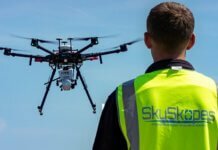After a rigorous competition, the Federal Aviation Administration (FAA) has selected a Mississippi State University team as the agency's Center of Excellence for Unmanned Aircraft Systems (COE UAS).
The COE will focus on research, education and training in areas critical to safe and successful integration of UAS into the nation's airspace.
According to the FAA, the team brings together 15 UAS and aviation universities that have a proven commitment to UAS research and development and the necessary resources to provide the matching contribution to the government’s investment.
“This world-class, public-private partnership will help us focus on the challenges and opportunities of this cutting-edge technology,” says Anthony Foxx, U.S. Transportation secretary. “We expect this team will help us to educate and train a cadre of unmanned aircraft professionals well into the future.”
The COE research areas are expected to evolve over time but initially will include as follows: detect-and-avoid technology; low-altitude operations safety; control and communications; spectrum management; human factors; compatibility with air traffic control operations; and training and certification of UAS pilots and other crewmembers.
The FAA expects the COE will be able to begin research by September and be fully operational and engaged in a robust research agenda by January 2016.
Congress appropriated $5 million for the five-year agreement with the COE, which will be matched one-for-one by the team members. Congress mandated that the FAA establish the COE under the Consolidated Appropriations Act of 2014.
In addition to Mississippi State University, the other team members include the following: Drexel University; Embry Riddle Aeronautical University; Kansas State University; Kansas University; Montana State University; New Mexico State University; North Carolina State University; Oregon State University; University of Alabama, Huntsville; University of Alaska, Fairbanks; University of North Dakota; and Wichita State University.
The FAA will determine the relationship between the new COE and the six UAS sites the FAA announced last year once the new team develops detailed research plans. The FAA expects COE flight testing to occur at one or more of the existing test sites.
U.S. Sen. Thad Cochran, R-Miss., chairman of the Senate Appropriations Committee, says, “Mississippi State University and our state have a wonderful opportunity to use their research expertise and unique facilities to advance and influence all aspects of the unmanned aerial sector, from national policies to deployment to manufacturing.
‘Unmanned systems are here to stay, and this national center will help ensure that they are used to improve American security and productivity, while protecting privacy. I commend Mississippi State for its diligence and expertise as a major research institute in putting together a team that can accomplish these goals.”









